The Mighty Peking Man Blu-ray Movie
HomeThe Mighty Peking Man Blu-ray Movie 
GoliathonArrow | 1977 | 90 min | Not rated | No Release Date
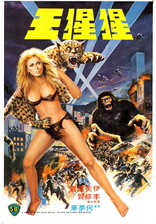
Price
Movie rating
6.3 | / 10 |
Blu-ray rating
| Users | 0.0 | |
| Reviewer | 3.5 | |
| Overall | 3.5 |
Overview
The Mighty Peking Man (1977)
A greedy Hong Kong businessman captures a 50-foot-tall ape from the Himalayas and puts it on display, but it escapes and goes on a rampage.
Starring: Danny Lee, Evelyne Kraft, Ku Feng, Norman Chu, Alexander GrandDirector: Meng-Hua Ho
| Foreign | Uncertain |
| Action | Uncertain |
| Adventure | Uncertain |
Specifications
Video
Video codec: MPEG-4 AVC
Video resolution: 1080p
Aspect ratio: 2.37:1
Original aspect ratio: 2.35:1
Audio
Mandarin: DTS-HD Master Audio Mono
English: DTS-HD Master Audio Mono
Subtitles
English, English SDH
Discs
Blu-ray Disc
Single disc (1 BD)
Playback
Region A (B, C untested)
Review
Rating summary
| Movie | 3.5 | |
| Video | 3.5 | |
| Audio | 3.5 | |
| Extras | 4.0 | |
| Overall | 3.5 |
The Mighty Peking Man Blu-ray Movie Review
Reviewed by Jeffrey Kauffman December 28, 2021 Note: This film is available on Blu-ray as part of
Shawscope Volume One.
If the Shaw Brothers' logo is intentionally reminiscent of the Warner Brothers' logo, there are a number of other connective tethers between the two
sets of siblings. The Warners founded what would become one of the "Big Five" studios in the American filmmaking industry in 1923, after having
had
some success as exhibitors. They went on to create one of the crown jewels of the "studio system" in the United States, eventually matriculating
pretty forcefully into the television side of things, even when some of their American competitors were not in such a huge rush to "help the enemy".
Somewhat similarly, the Shaw Brothers formed the first version of their moviemaking empire just two years after the Warners, in 1925,
though admittedly it took until 1958 for the organization to be called Shaw Brothers. Like the Warners, the Shaws had begun as venue
owners, though in their case they dealt in both film exhibitions (courtesy of their father) and live theater. Kind of interestingly, given one
of
the Warner's technological triumphs, the introduction of sound with 1929's The Jazz Singer, the Shaws are credited with having brought the "talkie" era to Chinese cinema in 1932 and 1933.
The
Shaws took a while to develop what many think of as their stock in trade, the kung fu films that started appearing in the seventies, but there's little
disagreement that their involvement in that genre massively helped to popularize it, much as the Warners had helped to make the so-called
"gangster
film" must see cinema in the 1930s. Again, understandably somewhat later than the Warners ventured into television in the 1950s, the Shaws
ultimately actually forsook the bulk of their movie output to concentrate on productions for the small screen. But Arrow is concentrating on some of
the studio's feature films from its perceived heyday, with the Volume One of this set's title hinting that fans may be just at the beginning
of
an exciting viewing adventure. As is often the case with these deluxe Arrow releases, the packaging is impressive and the supplemental features
are bountiful and outstanding.
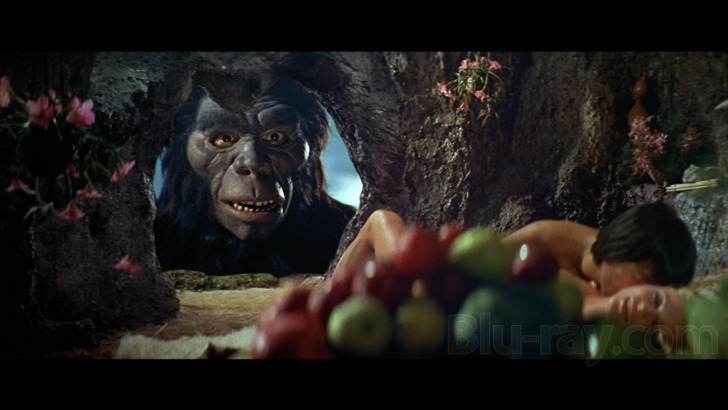
In case you've ever wondered what a Shaw Brothers version of King Kong might be like, wonder no more. And in fact it may have been the 1976 remake of King Kong which helped to spark this absolutely gonzo outing, which follows the general outlines of the better known "giant ape" story, while working in a number of weird and maybe even wonderful sidebars.
A certain tolerance for cheesiness and perhaps even campiness is probably necessary for those coming to The Mighty Peking Man, a film which kind of hilariously tends to be one of the better remembered Shaw Brothers epics from this general period, despite the fact that it is an outlier in terms of any perceived martial arts content. Instead, we have a "giant" (actually somewhat comically variably sized) ape who is marauding through the Himalayas and who, apparently like every giant ape, is ultimately captured in order to be put on display for a paying public. This film also has the somewhat unusual aspect that "beauty", in this case a kind of feral jungle creature named Samantha (Evelyne Kraft) isn't afraid of the beast, and in fact is his ally. Samantha teams up with expedition leader Johnny Feng (Danny Lee), who wants to capture both the ape and the gorgeous blonde.
This is a downright silly film by all measures, but for those with certain jaded sensibilities (ahem), it can be a lot of fun. It's patently ridiculous, and there may be a potent drinking game in seeing how often Samantha's bosom wants to escape from her skimpy bikini-esque outfit.
The Mighty Peking Man Blu-ray Movie, Video Quality 
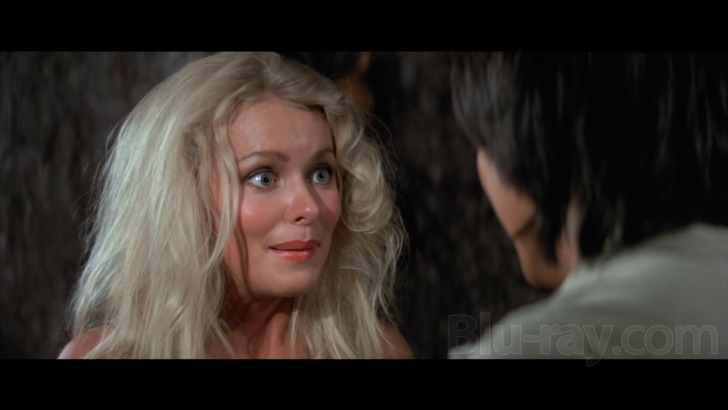
The Mighty Peking Man is presented on Blu-ray courtesy of Arrow Video with an AVC encoded 1080p transfer in 2.37:1. Arrow's nicely appointed insert pamphlet sized booklet contains quite a bit of information, though all of the films have been lumped together on one page, as follows:
All twelve films in this boxset are presented in their original 2.35:1 aspect ratios [sic] with their original Mandarin, English and Cantonese (where applicable) monoaural soundtracks. Every effort has been made to present these films in their original and complete versions using the best materials available.The Mighty Peking Man is another film in this set with a pre-existing restoration by Celestial Pictures which was provided to Arrow. Like some of its cohorts in that regard, this can show some slight signs of high frequency filtering, though there is definitely a grain field intact, one which can spike appreciably in some of the opticals (note, for example, screenshot 14). That said, there's a somewhat flat, video-like look to some of this transfer, though detail levels still tend to be quite pleasing throughout, as can be seen in several of the screenshots I've uploaded to accompany this review. The strength of the palette is one of this transfer's definite pluses, and a lot of the outdoor material pops extremely well. I noticed no major signs of age related wear and tear. My score is 3.75.
Five Shaolin Masters, Shaolin Temple, Mighty Peking Man, Executioners from Shaolin, Heroes of the East and the shorter Alternate Version of Chinatown Kid were remastered by Celestial Pictures in 2003-2007, as part of an initiative to digitally restore the entire Shaw Brothers library. The High Definition masters of these restorations, which included the original Mandarin and English mono soundtracks, were supplied to Arrow Films by Celestial Pictures.
King Boxer, The Boxer from Shantung, Challenge of the Masters, The Five Venoms, Crippled Avengers, Dirty Ho and the longer international cut of Chinatown Kid have all been newly restored by Arrow Films in 2021, in collaboration with L'Immagine Ritrovata, Hong Kong Film Archive and Celestial Pictures.
The original 35mm negatives for King Boxer, The Boxer from Shantung, Challenge of the Masters, The Five Venoms, Crippled Avengers and Dirty Ho were scanned at L'Immagine Rittrovata Asia and restored in 2K resolution at L'Immagine Ritrovata, Bologna. The Films were graded at R3Store Studios, London. These restorations have used the entire film negative without resorting to the practice of "frame cutting" resulting in the loss of film frames at each negative splice point.
The mono mixes were remastered from the original sound negatives at L'Immagine Ritrovata. Additional sound remastering was completed by Matthew Jarman/Bad Princess Productions. The audio synch will often appear loose against the picture, due to the fact that the dialogue and sound effects were recorded entirely in post production, as per the production standards of the period.
A 35mm internegative of the International Version of Chinatown Kid was scanned at L'Immagine Ritrovata Asia and restored in 2K resolution at L'Immagine Ritrovata, Bologna. The film was graded at R3Store Studios, London.
The mono mix was remastered from the original sound negative at L'Immagine Ritrovata. Additional sound remastering was completed by Matthew Jarman/Bad Princess Productions.
An additional scene from Chinatown Kid missing from the original elements was scanned from a vintage 35mm print and graded in 2K resolution at American Genre Film Archive (AGFA).
All original materials supplied for these restorations were made available from the Hong Kon Film Archive via Celestial Pictures.
The Mighty Peking Man Blu-ray Movie, Audio Quality 
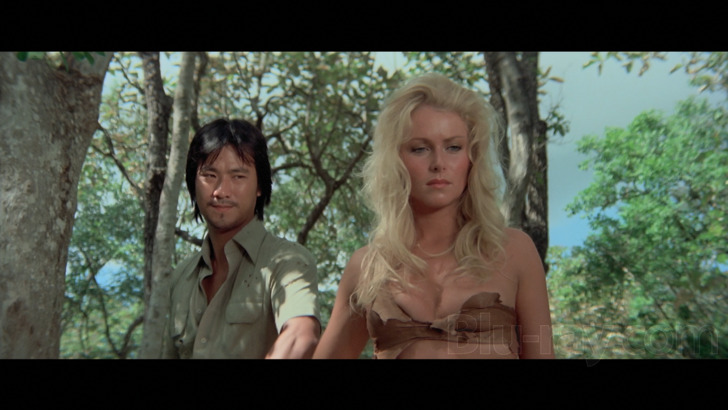
The Mighty Peking Man features DTS-HD Master Audio Mono tracks in either Mandarin or English. As with the other films in this set, I toggled between the two tracks as I watched the film. Amplitude and overall mix levels are very similar between the two tracks, but once again I found the Mandarin track to be noticeably more full bodied. The English track can sound pretty boxy in comparison, especially with regard to some of the sound effects (panicked crowd noises are one notable example). Dialogue (such as it is -- Samantha is basically pre-verbal) is presented cleanly and clearly. Optional English subtitles are available.
The Mighty Peking Man Blu-ray Movie, Special Features and Extras 
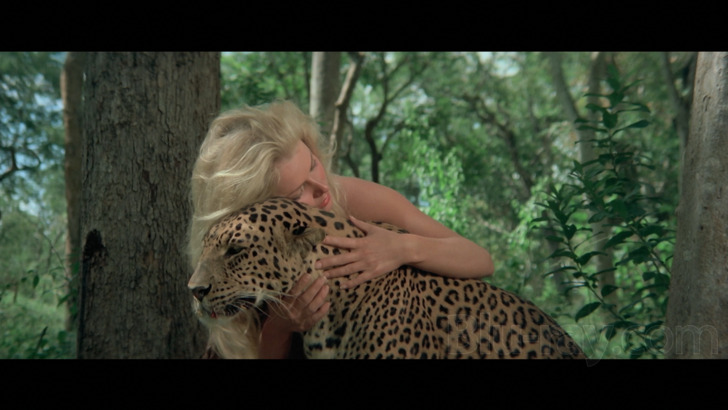
- Commentary by Travis Crawford
- Interview with Keizo Murase (HD; 19:23) is a newly produced piece with the actor and suit designer for the film. Subtitled in English.
- Interview with Ho Meng-hua (HD; 24:04) is a 2003 interview filmed by Frédéric Ambroisine. Subtitled in English.
- Interview with Ku Feng (HD; 7:18) is a 2004 interview filmed by Frédéric Ambroisine. Subtitled in English.
- Behind the Scenes Super 8 Footage (HD; 28:30)
- Unrestored Version (1:30:21) offers an ostensible standard definition version which is described, much as with Shaolin Temple, as arguably offer a more accurate representation of what the film looked like during its original theatrical exhibition. Also as with Shaolin Temple, while this is advertised as being in standard definition, but is actually in 720p.
- Alternate US Credits
- Goliathon Theatrical Opening (HD; 1:18)
- Goliathon TV Credits (HD; 1:11)
- Trailer Gallery
- HK Theatrical Trailer (HD; 3:23)
- German Theatrical Trailer (HD; 2:26)
- Dutch Theatrical Trailer (HD; 2:51)
- US Theatrical Trailer (HD; 1:59)
- US TV Spot (HD; 00:35)
- US Re-release Trailer (HD; 2:27)
- Digital Reissue Trailer (HD; 1:07)
- Image Gallery (HD)
The Mighty Peking Man Blu-ray Movie, Overall Score and Recommendation 
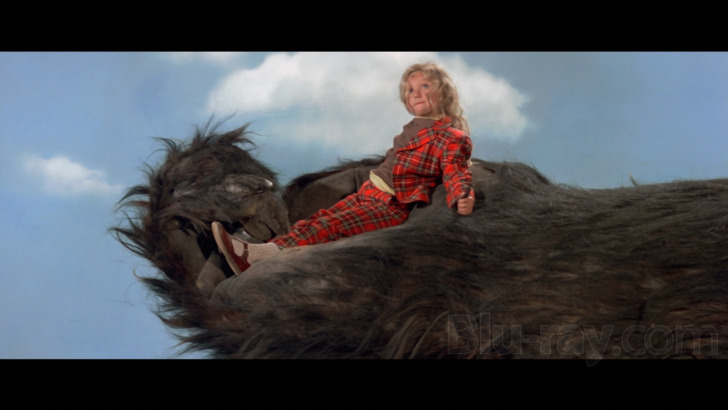
Hey, King Kong never got to see Ann Darrow and Carl Denham making out in a cave, so The Mighty Peking Man has that to its credit, but, joking aside, if you simply accept this film as the lunatic cartoon it is, it can be a lot of fun. Technical merits are generally solid, and as usual with Arrow's releases, the supplements are outstanding. Recommended.
Other editions
The Mighty Peking Man: Other Editions
Similar titles
Similar titles you might also like
(Still not reliable for this title)

King Boxer
Five Fingers of Death / Tian xia di yi quan
1972

Five Shaolin Masters
5 Masters of Death
1974

Chinatown Kid
1977

Executioners from Shaolin
The Executioners of Death / Hong Xi Guan
1977

Crippled Avengers
Return of the 5 Deadly Venoms
1978

Challenge of the Masters
Liu A-Cai yu Huang Fei-Hong
1976

Dirty Ho
Lan tou He
1979

Heroes of the East
1978

The Five Deadly Venoms
The Five Venoms / 五毒 / Wu du
1978

Five Superfighters
Tang shan wu hu / 唐山五虎
1979

Shaolin Temple
Shǎo lín sě / 少林寺
1976

The Kid with the Golden Arm
Jin bi tong / 金臂童
1979

Invincible Shaolin
Nan Shao Lin yu bei Shao Lin / 南少林與北少林
1978

The Boxer from Shantung
1972

Mercenaries from Hong Kong
Lie mo zhe / 獵魔者
1982

Magnificent Ruffians
Mai ming xiao zi / 賣命小子
1979

Ten Tigers of Kwangtung
Guang Dong shi hu yu hou wu hu / 廣東十虎與後五虎
1979

Martial Arts of Shaolin
Nan bei Shao Lin / 南北少林
1986

The Bare-Footed Kid
Chi jiao xiao zi / Chik geuk siu ji / 赤腳小子
1993

Mad Monkey Kung Fu
Feng hou / 瘋猴
1979
